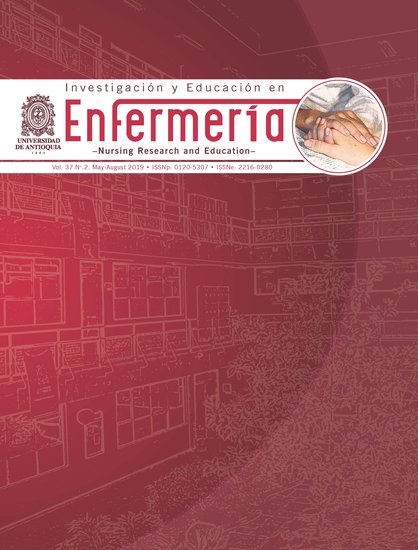Are nursing students trained to meet the needs of cancer suvivors and their families? New challenges, new opportunities
DOI:
https://doi.org/10.17533/udea.iee.v37n2e01Abstract
Current cancer treatments, along with more effective prevention measures, are producing increased cancer survival globally;(1) becoming – in many cases – a chronic disease.(2) Care of patients and families, living with a chronic disease, like cancer, constitutes one of the principal challenges for most health systems because they represent a heavy burden in terms of morbidity and mortality and carry a high percentage of the public expenditure in health.(3) Above all, the impact of cancer entails suffering and represents an important limitation in the quality of life, productivity, and functional state of the sick individuals and those living with them, that is, their family. More so, with evidence of the progressive increase of the number of older people with cancer, who are more prone to having comorbidities and other problems associated with their age, like dementia, depression, cerebrovascular accident, and diabetes.(4)
Downloads
References
(1) Siegel RL, Miller KD, Jemal A. Cancer Statistics, 2017. CA Cancer J. Clin. 2017; 67(1):7–30.
(2) Granek L, Mizrakli Y, Ariad S, Jotkowitz A, Geffen DB. Impact of a 3-Day Introductory Oncology Course on First-Year International Medical Students. J. Cancer Educ. 2017; 32(3):640–6.
(3) Nekhlyudov L, Ganz PA, Arora NK, Rowland JH. Going Beyond Being Lost in Transition: A Decade of Progress in Cancer Survivorship. J. Clin. Oncol. 2017; 35(18):1978–81.
(4) Bridges J, Wengström Y, Bailey DE. Educational Preparation of Nurses Caring for Older People with Cancer: An International Perspective. Semin. Oncol. Nurs. 2016; 32(1):16–23.
(5) Sánchez-Martín CI. Cronicidad y complejidad: Nuevos roles en Enfermería. Enfermeras de Práctica Avanzada y paciente crónico. Enferm. Clin. 2014; 24(1):79–89.
(6) García-Vivar C. Family-centered care: a necessary commitment to address chronicity. Metas Enferm. 2019; 22(2):3.
(7) Sociedad Española de Oncología Médica (SEOM). Informe SEOM: Formación de grado en Oncología: situación, retos y recomendaciones de futuro. Madrid: SEOM; 2018. Available from: https://seom.org/seomcms/images/stories/recursos/Informe_Formacion_de_pregrado_en_Oncologia.pdf
(8) European Oncology Nursing Society (EONS). Cancer Nursing Education Framework Contents [Internet]. London: EONS; 2018. Available from: https://www.cancernurse.eu/documents/EONSCancerNursingFramework2018.pdf
(9) Díaz MDM. Metodologías para optimizar el Aprendizaje. Segundo objetivo del Espacio Europeo de Educación Superior. Rev. Interuniversitaria de Formación Profesoral. 2006; 20(3):71–91.
(10) Watson E, Shinkins B, Frith E, Neal D, Hamdy F, Walter F, et al. Symptoms, unmet needs, psychological well-being and health status in survivors of prostate cancer: implications for redesigning follow-up. BJU Int. 2016; 117(6B):E10–9.
Downloads
Published
How to Cite
Issue
Section
License
Copyright (c) 2019 Investigación y Educación en Enfermería

This work is licensed under a Creative Commons Attribution-NonCommercial-ShareAlike 4.0 International License.
Derechos de propiedad / Direitos de Propriedade
English: If the article is accepted for publication, all copyright will be of exclusive property of Investigación y Educación en Enfermería. The text and the graphics included in the publication are exclusive responsibility of the authors and not necessarily reflect the thought of the Editorial Committee.
Español: Si el artículo es aprobado para publicación, todos los derechos son de propiedad de Investigación y Educación en Enfermería. El texto y las gráficas incluidas en la publicación son de exclusiva responsabilidad de los autores y no necesariamente refleja el pensamiento del Comité Editorial.
Português: Se o artigo for aceito para publicação, todos os direitos autorais serão de propriedade exclusiva de Investigación y Educación en Enfermería. O texto e os gráficos incluídos na publicação são de responsabilidade exclusiva dos autores e não refletem necessariamente o pensamento do Comitê Editorial.















